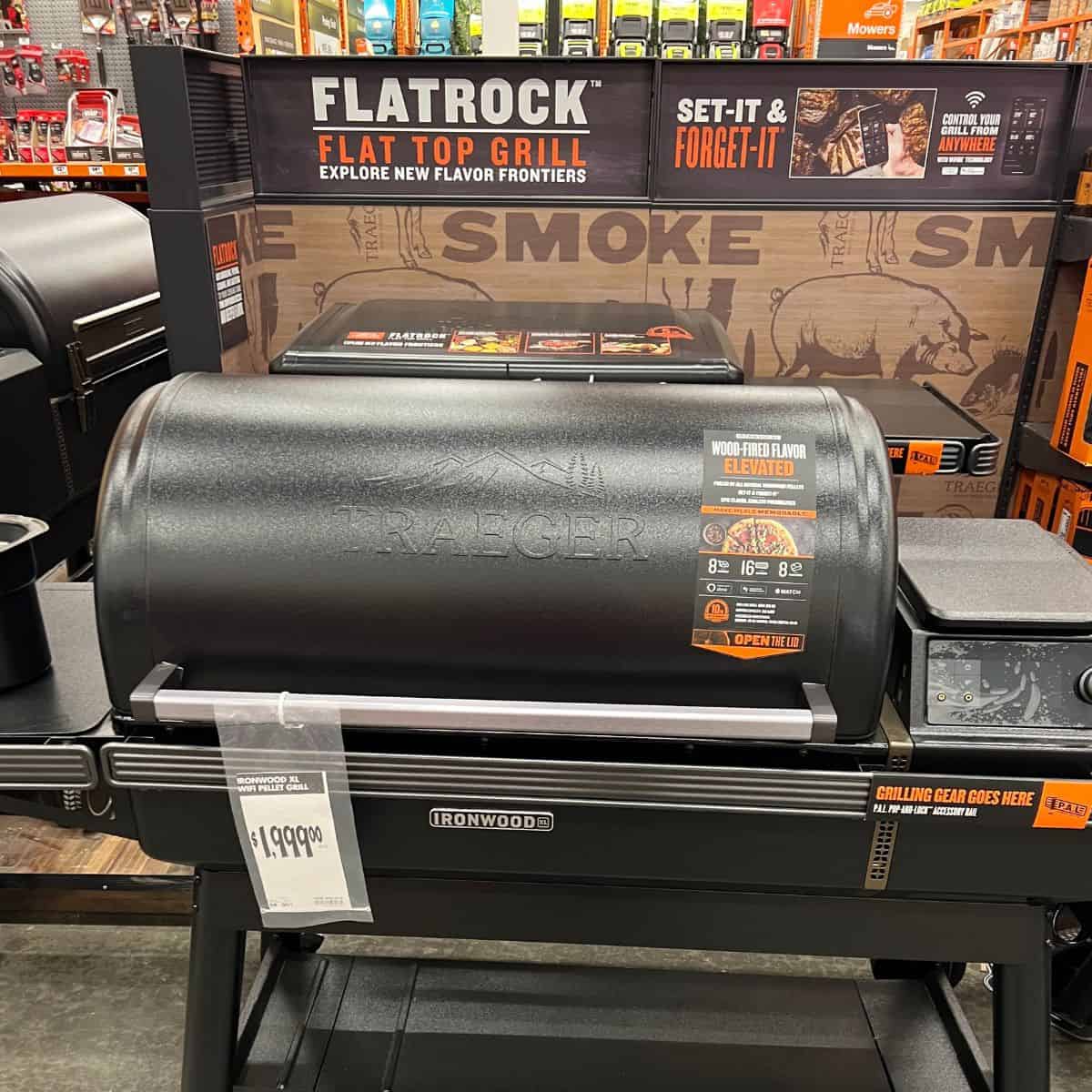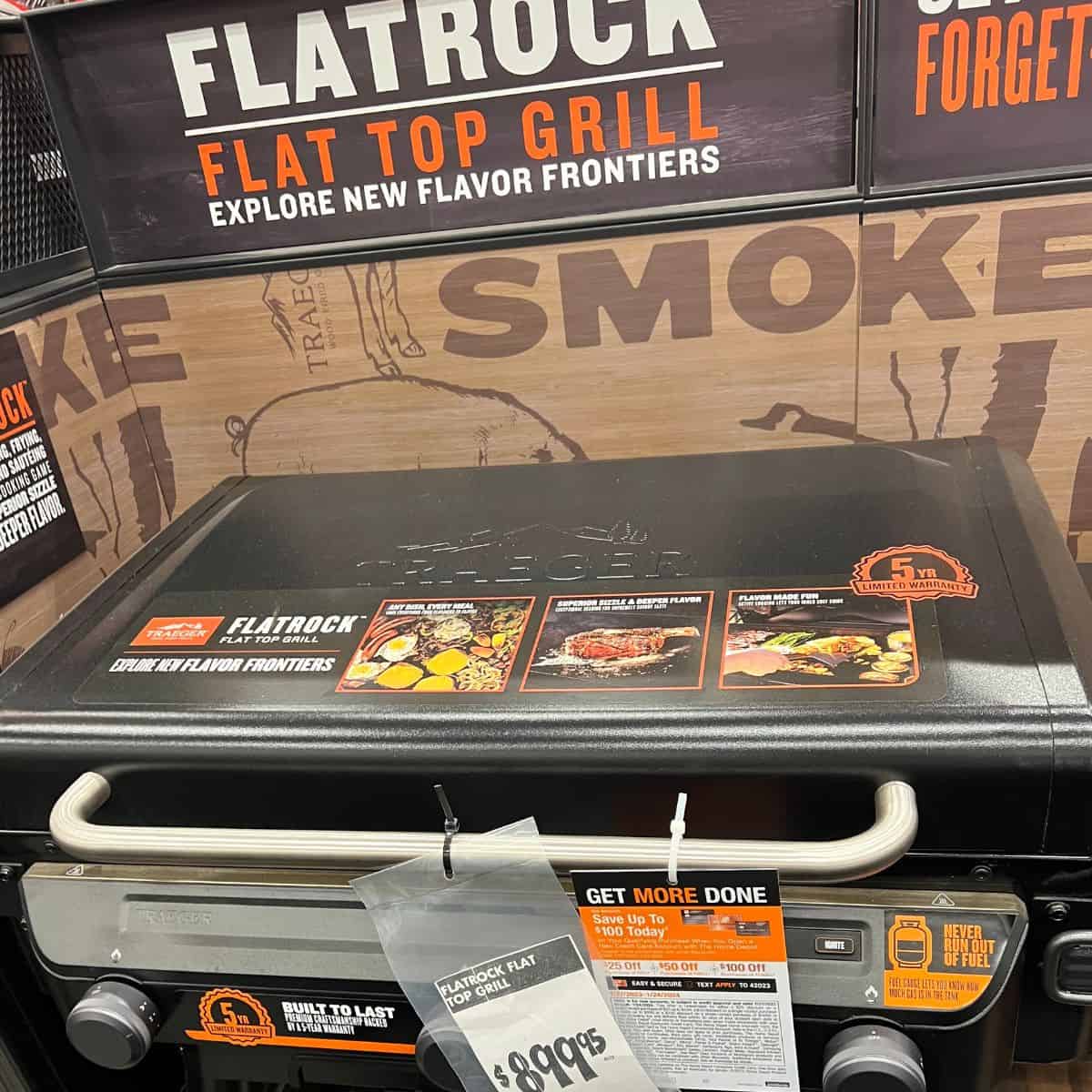There are a lot of advantages to cooking on both a grill or a griddle, and a lot of people use both of these appliances to make some of the best foods you can have.
The thing is, as much as some companies want you to think that these two cooking appliances are interchangeable, the truth is that they are similar, but hardly the same.
Knowing what each appliance is best at, how they are best used, and the pros and cons of each cooking style is critical if you’re deciding between a grill or a griddle for your home.
Let’s take a closer look at these two appliances, how they work, and what you can expect from them.
What Are They: Grill Vs. Griddle, The Basics
First, let’s make sure we’re on the same page as to what these two appliances are.
A grill is a contained cooking area, usually where proteins and other foods are resting on a metal grill (which is where the name comes from) with a heat source underneath and an insulating hood.
Grills use a variety of heat sources, from the most traditional woodfire grills where you start a fire, and then cook over the coals, to charcoal grills, and more modern versions like propane or natural gas-powered grills.
Some grills also double as smokers, or at least let you get a smoked flavor into your food, with the addition of hardwood chips or pellets. However, not all grills have that option, and not all grills hold in enough smoke to get those flavors.
Some grills can also have multiple cooking zones and heat areas, or an indirect heat rack for slower cooking. However, those are additional features, and you won’t always find them on more basic or more specialized grills.
Griddles on the other hand, are flat metal cooking surfaces rather than a metal grill. They apply direct heat, and can often get as hot as grills, but without directly exposing what you’re cooking to the fuel.
In addition, while there are some woodfire griddles and other fuel types, most modern griddles are fully electric and don’t need an additional heat source.
Since griddles are a completely flat surface, they also usually have a great trap for oils, fats, and other liquids that escape your food. Grills allow those liquids to drip into the flame, which can contribute flavor and heat, but can also make grilling fatty foods a little more challenging.
On the other hand, the grease trap on a griddle needs regular cleaning and can be a bit of a challenge if you accidentally let the great congeal or curdle before cleaning the grease trap.
What Kinds Of Cooking Are They Best For, Grill Vs. Griddle
Now that you know a little more about grills and griddles, and the primary differences, let’s talk more about how you use them to cook and what they do well. We’ll start with grills first:

What Grills Are Best For:
Right up front, there are a lot of advantages to cooking directly over a fuel source that produces both heat and smoke. If you’re looking for a smokey flavor, but don’t want to go so far as to get a dedicated smoker, a grill is going to be the better option.
Grills are also a great cooking option if you want your meals to be as lean as possible. Since a lot of the fat will render out of proteins while they are on the grill, dripping down rather than staying on your food, you can trust that most grilled meats are going to be leaner than other cooking methods.
However, that can actually make cooking inherently low-fat meats more of a challenge. It can be easy to accidentally dry out those lean meats since the fat will naturally try to escape the meat. That said, the dry heat of a grill can also help.
That’s because high dry heat creates its own umami flavors and can make food taste more satisfying, even if it’s mostly fat-free. Plus, grilling uses a lot less cooking fat than other cooking methods.
Grills also give your food a distinct look thanks to the sear from the grill itself. The lines of dark-seared or char on meat, fruit, and vegetables, is an immediate visual cue, and can even help make your food taste better from anticipation.
Lastly, grills are fantastic for cooking a large amount of food at the same time. They can be the perfect cooking appliance for large gatherings, or for creating a lot of different kinds of food all at the same time.
Not sure what to make on a grill. Here are some ideas of recipes you can try!

What Are Griddles Best For
Griddles have a lot of similar benefits to grills, but the few key differences will really show up in your food.
For one thing, a griddle is going to be the more versatile of the two, almost inherently. The flat cooking surface means that you can also make things like pancakes and eggs on your griddle, without needing another cooktop to help.
On a grill, you would need either a cast-iron pan or a griddle attachment to make it possible to cook those runny or liquid ingredients at the same time as your protein and veg. It’s possible, but it’s less convenient and usually means more cleanup compared with a griddle.
Griddles are also great for things like smash burgers and can give you even faster cooking in some circumstances than grills.
On the other hand, most people think it’s easier to get low-temperature cooking on a griddle as well as higher temperature. It depends on the griddle of course, not all of them will have high and low-temperature ranges, but many do.
Griddles are also a great substitute for woks and can make Asian cooking a lot easier. They can even mimic the famous wok hei (pronounced hay) that comes from high cooking, hot cooking oil, and freshly seared ingredients.
This is part of where that versatility comes in again. You can make noodles, seafood, steaks, chicken, and more on a griddle. It’s also usually safer to put pots and pans on a griddle top than on a grill (though it can take a moment for the heat to transfer from the griddle to the pan), which means that you can use a large griddle as a complete cooking surface for almost anything that doesn’t need an oven.
Wanting more cooking inspiration? These recipes might work best for a Blackstone griddle, but they’re also great for any griddle. Here are 25 of the best griddle recipes for you to try!
What Grills Can’t Do
On their own, grills do have some limitations.
The biggest limitation is that you need specialized pots and pans that can handle the heat and heat source on a grill if you want to make sauces, soups, or pastas on the grill at the same time.
Grills also tend to do better with larger pieces of meat, vegetables, or fruits. You can cook smaller chunks on a skewer or something similar, but without a skewer, those smaller pieces are more likely to fall between the cracks in the grill.
You should also think about what kind of finish you prefer on your proteins. Grills can give you the ultimate sear and help reduce cooking fat while also locking moisture inside your protein, but they aren’t as good at producing the savory Maillard reaction.
Grills might not need frequent cleaning, the way griddles and other cooking surfaces do, but cleaning them also tends to be more of a chore. You’ll need specialized bristle brushes and other tools to help maintain your grill. You also might need a specialized guide, or to buy cleaning tools from the manufacturer of the grill, because the wrong tools can damage your grill.
What Griddles Can’t Do
Griddles also apply high heat like grills, but they don’t give you the same smokey flavor or fresh off-the-grill texture.
It can also be tempting to add a lot more fat when you’re cooking on a griddle, especially since liquids tend to boil off relatively quickly when you’re cooking.
A clever cook can use water, vinegar, juices, wine, and other alternatives to cooking fat on a griddle, but it can take practice and experimentation to get good at it. Also, the flavor from those other cooking liquids is different from adding a cooking fat like olive or sesame oil or butter.
Your foods will also retain more of their natural fats when you cook on a griddle instead of a grill. That’s because the grease doesn’t run off the food, and instead sits with it while you’re cooking. That can be great for flavor but does mean that you’re likely to get a few more calories from foods cooked on a griddle instead of a grill.
What Cooking Appliance Is Right For You, A Griddle Or A Grill?
Choosing between a griddle and grill can be challenging, but this guide should have given you some sense of what each appliance is best for, and how they work. Here are a few questions to ask yourself when you’re deciding which option is best for you.
Do I enjoy savory smokey flavors or buttery savory flavors? While you can use both a grill and a griddle to get both smokey and buttery flavors, grills are better for smoke, and griddles are better for buttery.
Do I want to be able to cook a lot of different kinds of foods on this appliance, or do I want a specialized appliance that works particularly well for some foods? Some people cook literally everything they don’t bake on their griddles. Grills are a little more limited and less versatile, so they tend to work better for people who want a specialized appliance.
Do I mind buying specialized tools and equipment for my cooking, or am I okay with having a different set of tools for my new appliance? This last question is important. Griddles need a little specialized equipment, but they don’t need nearly as much of it. If you want to make the most of your grill, you’ll need grilling tools, grill-safe pots, and pans, and you might even want to get a small griddle to fit over part or all of your grill surface. If you don’t mind buying those, a grill might be right for you. If you want all the versatility, without needing the extra tools, a griddle is probably the better choice.
Both grills and griddles can be incredibly powerful cooking appliances, but they are better for different kinds of cooks. Unless you’re planning to get both at some point, it’s worth thinking about which appliance is right for you before you buy.

